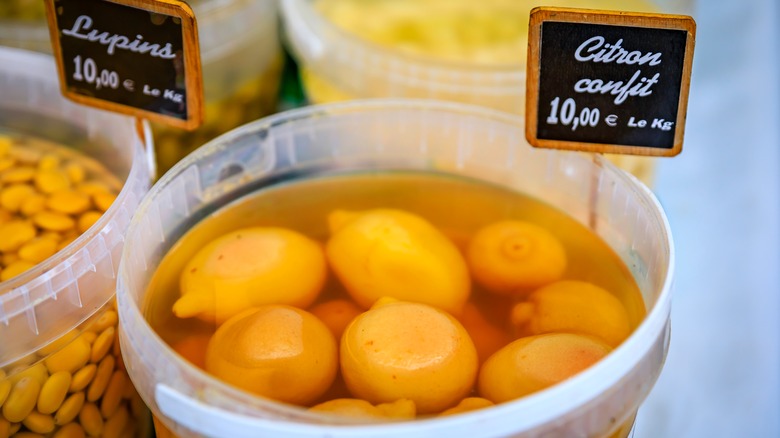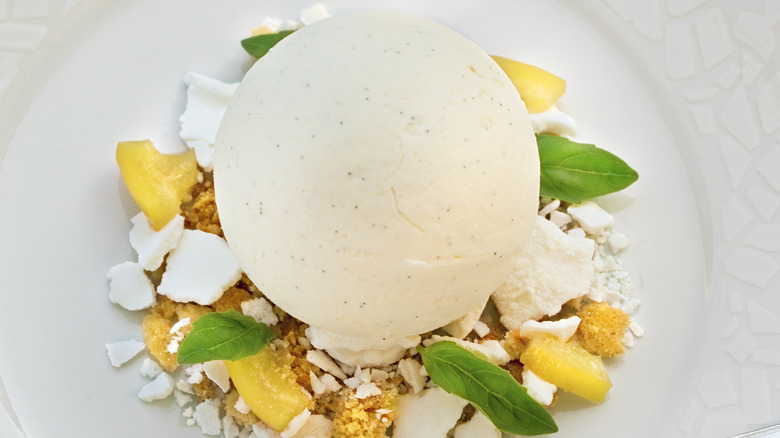The Simple Lemon Topping Eric Ripert Uses Constantly At Le Bernardin
It's not surprising that Eric Ripert, the renowned chef of New York City's legendary upscale restaurant, Le Bernardin, adds lemon to his fish-centric plates; after all, it's a common ingredient used to brighten seafood dishes. But given the chef's accolades and experience, we should've known it wouldn't be as basic as lemon juice.
Ripert uses the old-world French condiment lemon confit for his signature dishes like broiled snapper, but also pairs it with legumes and other proteins. There are a few confit techniques (savory and sweet) used initially to preserve ingredients, but are now done simply because they taste good. Fatty meat like duck is commonly confited by slowly cooking the protein in fat until it's melt-in-your-mouth tender, alliums like garlic are simmered in olive oil for a spreadable, mellower taste, and fruits in concentrated sugar syrup.
Ripert's simple method for lemon confit requires a few weeks of hands-off preparation and just three ingredients — lemons, kosher salt, and granulated sugar. Unlike other practices, this confit is not cooked by heat. It is cured by a salt-sugar mixture, making this version perfect for savory dishes and adaptable for almost every meal.
How to make lemon confit
Since lemon growers coat the fruit in wax to keep them from drying out, it's essential to scrub or plunge the lemons into boiling water for 20 seconds to remove the wax beforehand. Cleaned, quartered lemons are then layered in a quart-size jar with a salt and sugar mixture and refrigerated for at least two weeks before being enjoyed.
The confit will last several months in the refrigerator, turning the peel into concentrated, tender, lemony pieces. Since the citrus isn't submerged in a liquid providing a barrier against harmful bacteria, it shouldn't be left at room temperature. Pantry storage requires proper canning techniques.
Before using, Ripert rinses the cured lemons well and removes the peel for dishes. He blends minced lemon peel confit with softened butter before broiling fish and serves more with the plated dish. If you don't have two weeks to wait, jarred Moroccan preserved lemons can be used in a pinch.
Alternatively, lemon confit can be made quicker in the oven with olive oil and spices. Preheat the oven to 250 degrees Fahrenheit and place thinly sliced lemons with salt, black peppercorns, fresh rosemary, shallots, garlic, and brown sugar (or balsamic vinegar) in a casserole pan for two hours. Once cooled, the confit can be stored in an airtight container in the refrigerator.
Recipes to use lemon confit
Homemade lemon confit can be adapted for savory or sweet dishes, making it easy to elevate most dishes, even a scoop of vanilla ice cream. Garnish a scoop (or two) with fresh basil leaves for an earthy element, crushed biscotti for a welcome crunch, and diced lemon confit to brighten the dish. This "no-recipe" recipe is a great dessert to keep in your back pocket when entertaining and can be adapted to whatever you have on hand.
Traditionally served with Moroccan tagines, diced preserved lemons are delicious in a stew of chicken thighs, onions, garlic, dried apricots, and black olives seasoned with coriander and ras el hanout. Serve tagines over cous cous to absorb the flavorful sauce, and garnish the plate with slivered almonds and more lemon confit.
After charring on the grill, grilled veggies like broccoli and asparagus benefit from citrus, as does meat like pork and the countless grilled chicken breasts we make when the weather is warm.
A pound of spaghetti or bucatini is instantly transformed when tossed with minced lemon confit, freshly chopped Italian flat-leaf parsley, and topped with homemade breadcrumbs. Add some butter or olive oil and thicken the pasta with its cooking water to pull together a silky sauce in under 20 minutes that's finished with a generous shaving of Parmigiano-Reggiano cheese.



